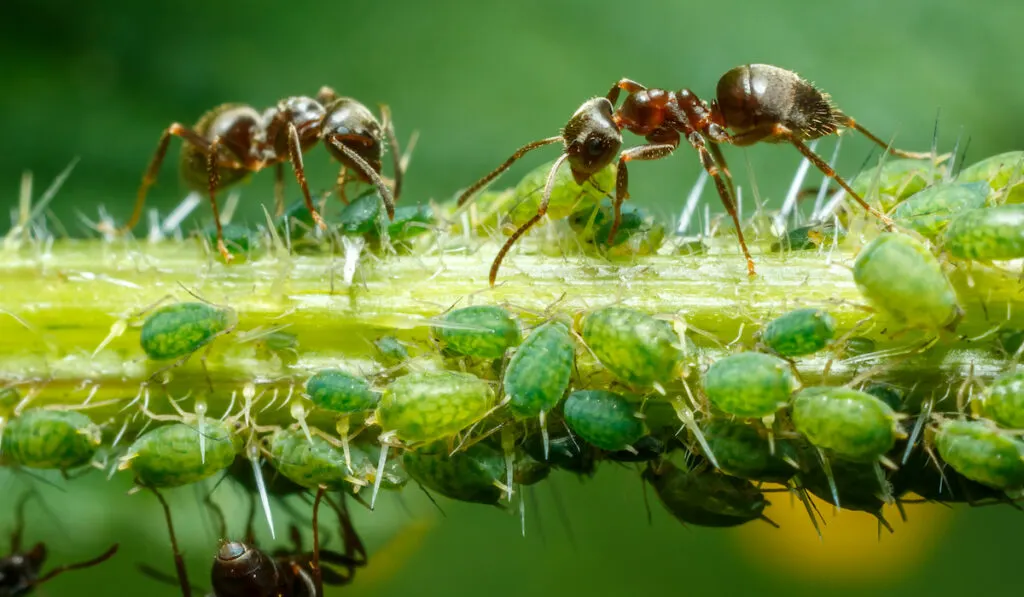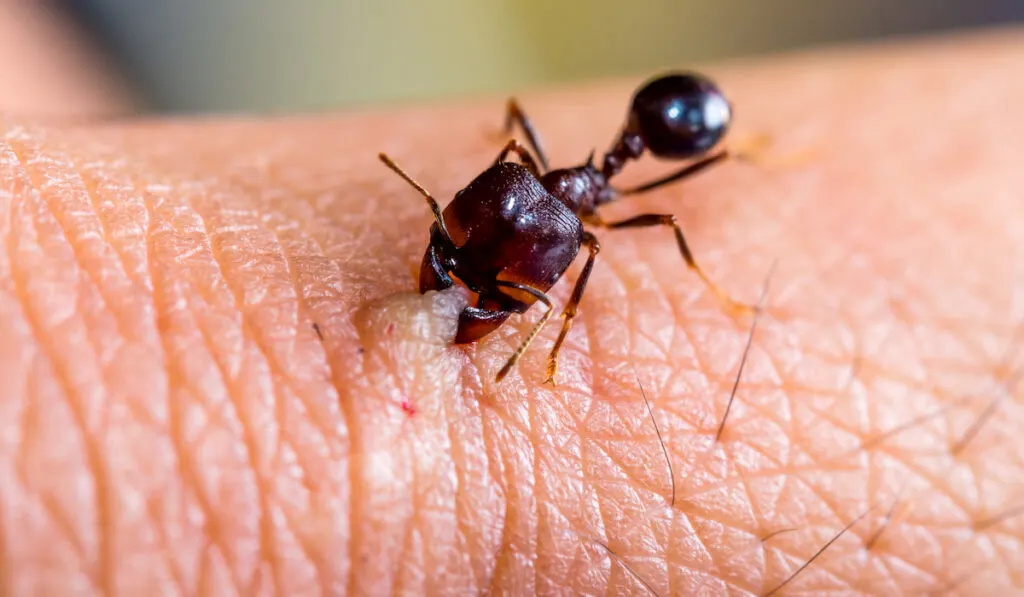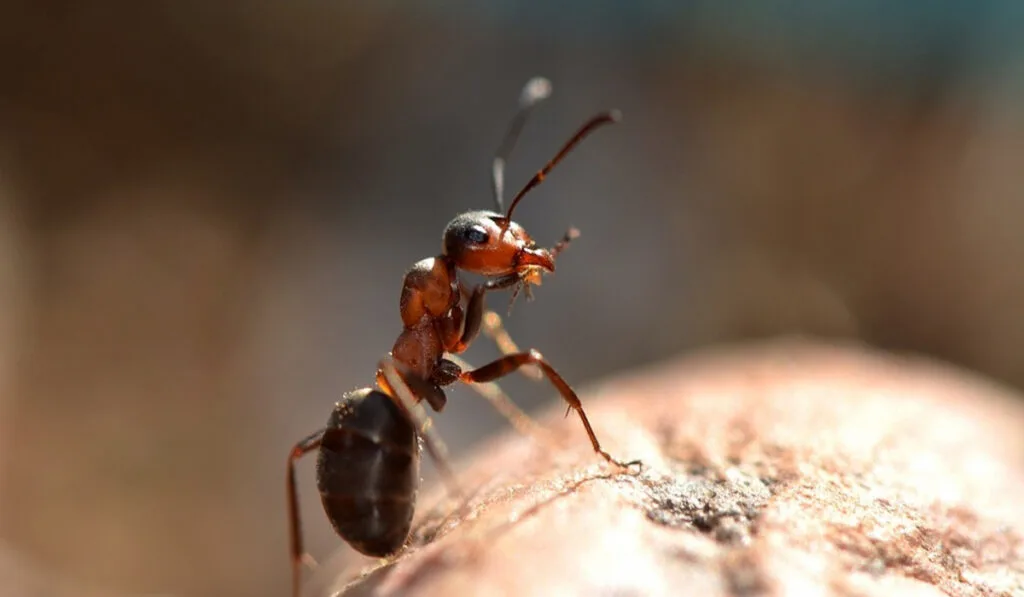Is your garden overrun with ants? Are they burrowing into your vegetable garden bed or digging deep into the soil of potted plants? In this article, I’ll give you some tips for getting rid of ants in the garden without killing your plants.

The top 6 ways to get rid of ants in the garden naturally are:
- Borax and Sugar
- Diatomaceous Earth
- Brewed coffee grounds
- Baking Soda and Powdered Sugar (Equal Parts)
- Eliminate Aphids
- Vinegar
Table of Contents
Natural Ant Control Methods
The methods outlined below should give you a variety of ideas to eliminate or control ants in your garden naturally, without the use of harmful or harsh chemicals.
1. Borax and Sugar
A 50/50 mixture of borax and sugar will help to control ants. Sugar is what the ants are after and they wont be able to tell it has been mixed with Borax.
Ants will readily take the mixture back to the next and share it with others. Borax is poisonous to ants and pretty soon the ant colony will be no more.
2. Diatomaceous Earth
Diatomaceous Earth, commonly called “DE” is super fine rock that has been crushed into powder. There are many varieties of it, including food grade diatomaceous earth which is generally safe to be consumed.
This makes DE a great option for using in a vegetable garden particularly. But how does it help with ants?
Think about diatomaceous earth as tiny little razor blades that can cut through the exoskeleton of insects.
A word of caution though. Using diatomaceous earth will kill most garden insects, good and bad. That means that you should limit its use to only those areas with specific ant issues.
DE is great to use around the outside of your house or other structures as well as garden paths. You can also use it directly on top of and around an ant hill should you be lucky to find it.
3. Brewed Coffee Grounds
If you are anything like me, you enjoy a fresh pot of coffee every morning. Instead of discarding your coffee grounds in the trash, try using them to discourage ants in the garden.
While coffee grounds aren’t toxic to ants by any means, they seem to repel them based on smell alone. Ants will tend to avoid areas with coffee grounds when given the choice.
While not the most effective solution on this list as far as eliminating ants, coffee grounds can be a deterrent and are perfectly safe to use right in your garden beds.
4. Baking Powder and Sugar
If you aren’t too keen on using the borax and sugar method described above, consider using baking powder and sugar instead.
A 50/50 mixture of baking powder and sugar can provide an effective way to get rid of ants naturally. Simply combine and place in a jar lid or other shallow dish. The ants will take the mixture back to the nest and you should see a reduction, or even complete elimination, of ants within a few days.
The best thing about this mixture is that you are likely to have the ingredients on hand in a pinch.
5. Aphid Control

While not a method to eliminate ants, controlling aphids can certainly help reduce their numbers. Aphids secrete a substance commonly referred to as “honeydew” which provides food for ants.
The more aphids your garden has, the more attractive it is for ant colonies. To help curb that attraction, simply eliminate the aphids. There are many ways to accomplish this including releasing natural aphid predators, such as lady beetles, into the garden.
6. Vinegar
Vinegar is an excellent ant repellent. Simply mix vinegar and water 50/50 into a spray bottle and use wherever ants are an issue.
You can use plain white vinegar or apple cider vinegar, depending on what you have on hand. Ants seem to be adverse to strong smells and vinegar is one way to encourage them to take up residence elsewhere.
Keep in mind that vinegar may have to be reapplied frequently to remain effective.
Pros and Cons of Ants in the Garden
| PROS | CONS |
| They Are Natural Soil Aerators | They Can Bite |
| They Kill Caterpillars | They May Move Into the House |
| They Encourage Aphid Growth | |
| Some People Are Allergic to Ants |
Pros
Natural Soil Aerators
Anybody who has seen an “ant farm” kit sold for children knows that ants love to dig underground tunnels. These tunnels serve as pathways for an ant to move from place to place.
Ant tunnels have a positive benefit for your garden. They allow oxygen to move through the soil, aerating it for healthy plants and roots.
Eliminate Caterpillars
Many species of ants will eat the very caterpillars that wreak havoc on your garden. This “pro” could also be a con though.
While most gardeners would agree, we’d prefer not to have any insects eating the leaves of our plants, sometimes the caterpillars are beneficial as well.
According to Science in the Classroom, the ants penchant for eating caterpillars is actually a detriment to some butterfly species.
So this one can be a trade off. If you have bad caterpillars, ants are a positive thing in your garden. If you want your garden to be home to butterflies, the ants are a negative thing to have in your garden.
Cons
They Bite

All ant species can bite but that bite is more painful from some than others. Growing up in Southern California we learned that black ants were “nice” and red ants were “mean”.
As an adult, I realize that really isn’t the case. Black or red, ants can bite and it can hurt! Compound that by getting multiple bites and you can totally see why someone would want to eliminate ants from being in the garden.
For most people, an ant bite causes redness, irritation and itchiness. For some, depending on the species of ant, a bite can be fatal. One of my cousins in Arizona must carry an Epipen with him everywhere he goes. For him, a single bite from a single ant is enough to cause a potentially fatal allergic reaction.
In general, though, ants mind their own business. So long as you don’t accidentally step into an ant hill, or decide to take a seat in your garden right in the path of some busy ants, you shouldn’t have to worry too much about getting bit.
Ants Can Move Into the House
This problem is actual two fold. Some ant species might venture into the house in search of more food. If you have never woken up to ants in the kitchen, consider yourself lucky!
Ants are opportunistic and even if they have a natural supply of food in your garden, having them nearby means that scouts are more likely to venture into your home in search of more food.
If they find anything, they’ll quickly head back and grab reinforcements. One muffin left on the counter top is all that is needed. Pretty soon they are into everything. They can even chew through plastic bags and cardboard boxes.
Ants Encourage Aphid Growth

Did you know that ants are farmers too? We all know they love sugar. It is what sustains them and these clever little insects have found a way to farm it.
They do so by milking aphids. They seem to maintain aphids like a farmer might maintain his sheep. Aphids secret a substance called “honeydew”. High in sugar, ants will “milk” aphids to get to this sweet extract and then take it back to the queen.
Ants have even been seen picking up aphids and moving them from plant to plant so they can get more nutrition. While a benefit of having ants around is their help with controlling caterpillars, a disadvantage is their affinity for aphids!
Did you know ants will actually protect aphids from other insects, like ladybugs? Just as a farmer would protect his flock from a coyote or other predator, ants will defend their aphids against predators.

Know Your Ant Species
The big thing to remember is that it is definitely important to know what kind of ant you are dealing with before making a blanket decision about whether they should be eliminated.
Your typical garden ant is beneficial in many ways and is not an insect you should typically have to worry about. You may try aphid control to help reduce their numbers, but overall they should not be a problem.
Carpenter ants and fire ants, on the other hand, can cause issues. Carpenter ants will burrow into any wood they can find causing damage and destruction. Fire ants bite, and it hurts BAD.
If you have fire ants or carpenter ants, you’ll definitely want to start employing methods to eliminate them as soon as possible. But what if you aren’t sure what kind of ant you have?
The good news is, your local agriculture college or university should have an entomologist on hand. Sometimes its as easy as emailing in a picture. Other ways to help get an ant identity is by posting a picture on any of a variety of online social platforms like Facebook.
Many experienced gardeners are often willing to help not only with identification of your particular ant but also with their own experiences with the species.

Sheryl
Saturday 19th of June 2021
Can you use vinager & water on the squash plant?